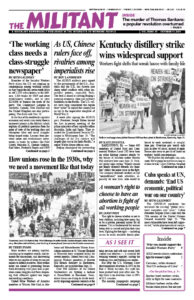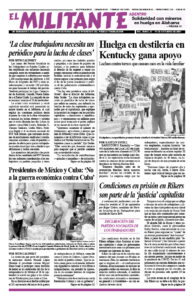The COVID-19 pandemic has worsened the existing “global structural inequities and crisis,” Cuban President Miguel Díaz-Canel told the 76th session of the United Nations General Assembly Sept. 23. “The most vulnerable have been left unprotected,” while pharmaceutical companies have reaped massive profits.
The way to combat the disease is through vaccination, he noted via video from Cuba, but “hundreds of millions of people in low-income countries are still waiting for their first dose and cannot even venture a guess as to when or if they will ever get it. At the same time, it’s beyond belief that global military expenditures were almost $2 trillion in 2020.
“How many lives would have been saved if those resources had been invested in health or the production and distribution of vaccines?”
The crisis is not new, Díaz-Canel told a U.N. food system summit later in the day. “More than 2.3 billion people, 30% of the world’s population, lack access to adequate food, and malnutrition is widespread,” he said, noting that Fidel Castro, the central leader of Cuba’s socialist revolution, had made the same point at the U.N. 25 years ago, but little has changed.
“The squandering of natural resources and the irrational patterns of capitalist production and consumption must end,” the Cuban president told the General Assembly.
Díaz-Canel pointed to the success the Cuban people have had combating the pandemic while standing up to the more than 60-year-long U.S. economic and political war against their revolution. “The U.S. government has not ceased its attack against Cuba for a single minute,” he said. That’s true whether Democrats or Republicans held office.
The administration of President Joseph Biden has maintained all 243 measures tightening the U.S. embargo added by former President Donald Trump, including placing Cuba on “the spurious and immoral list of countries that allegedly sponsor terrorism.”
While governments of the wealthiest capitalist nations refuse to organize production to make sufficient vaccines accessible worldwide, Cuba has developed its own vaccines, which are proving to be more than 90% effective. By the end of the year nearly 100% of Cuba’s population, from 2 years old on up, will be fully vaccinated, Díaz-Canel reported.
The Cuban government has mobilized medical workers and mass organizations across the island to deliver the vaccine, go door to door to discuss how people are doing and to help them if they feel sick, to assure that the vaccination program is successful.
Cuba’s selfless solidarity
The Cuban government has also offered its vaccine to other governments or to help them set up their own production. “We carry out selfless solidarity with those who need our support,” the Cuban president said.
In his speech at a U.N. conference on the fight against racism, Díaz-Canel noted that “thousands of Cubans supported the movements for national liberation in Africa and against the abusive apartheid regime.”
Castro led the Cuban government to immediately respond to a request from the Angolan government for help in defending the country from an invasion by South Africa’s white-supremacist regime. Between 1975 and 1991 some 425,000 Cubans volunteered to join that struggle, mostly as combatants, dealing decisive blows to the invading forces defending Angolan independence and helping to bring down apartheid in South Africa.
That internationalism lives on today in Cuba’s medical missions around the world. Since the start of the pandemic Cuba has sent nearly 5,000 internationalist medical volunteers to 40 countries and territories to combat COVID-19.
Socialist revolution in the Americas
These achievements are only possible because workers and farmers, led by Castro and the July 26 Movement, overthrew the U.S.-backed dictatorship of Fulgencio Batista in 1959 and established a workers and farmers government. They carried out a deepgoing agrarian reform, which guaranteed land for peasants; nationalized foreign and local companies and placed them under workers control; and became different people in the process. In the course of these struggles they came to recognize the Marxist politics of their leadership and the socialist character of their accomplishments.
Representatives from at least a dozen countries spoke out against the U.S. embargo of Cuba at the U.N. assembly over the last week. This included representatives from Benin, Bolivia, Equatorial Guinea, Gabon, Gambia, Lesotho, Mexico, Namibia, South Africa, Suriname, Venezuela and Vietnam.
Two days before Díaz-Canel’s presentation, Biden addressed the General Assembly. He urged governments to “act now to get shots in arms as fast as possible” to combat COVID-19, while offering no course of action that could make that possible.
Biden condemned the governments of Cuba and Venezuela, claiming they “seek to suffocate their people with an iron hand.”
In response, Cuban Foreign Minister Bruno Rodríguez said the U.S. president claims he is worried about the impact of COVID-19 on everybody, but keeps in place all the measures against Cuba that were imposed by Trump, which make getting medicine and medical equipment even harder.

